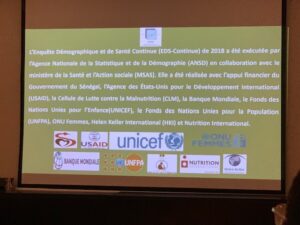A MILESTONE IN THE POLICY-MAKING PROCESS
In 2016, World Health Assembly Resolution 69.9 urged countries to implement the Guidance on Ending the Inappropriate Promotion of Foods for Infants and Young Children in their national legal frameworks. Recently, Senegal made major progress towards this policy change. On September 20-21st, Senegal’s draft decree on the marketing of foods for infant and young children was revised and adopted with some comments by the Government General Secretary’s Technical Committee. The meeting to review the content of this draft decree was chaired by the Director of Normative Affairs with the attendance of government agency/ministry representatives and Helen Keller International’s ARCH Project, which supports the Ministry of Health in this process. This was a big achievement for Senegal since this represents the final formal meeting required before the adoption of the decree by the Council of Ministries and by the President of the Republic of Senegal. We hope that by the end of this year, Senegal will have in place an up-to-date regulation which strengthens the protection, promotion and support of breastfeeding throughout the country.

QUESTIONS ABOUT SNACK FOODS CONSUMPTION PROPOSED BY THE ARCH PROJECT INCLUDED IN THE NATIONAL DEMOGRAPHIC AND HEALTH SURVEY
Senegal’s 2018 Continuous Demographic and Health Survey (C-DHS) now includes indicators on the consumption of snack foods by children 6-23 months of age. These are indicators which we first published in our 2016 study of commercial food consumption among Dakar children under 24 months of age. Inclusion of these indicators in this national survey is important— policy decisions can be informed by more complete data about the foods that children are consuming. Findings show that savory snacks— namely chips— were consumed on the previous day by almost half of the 12-23 month-old children living in urban areas. Savory snacks were consumed more often than sugary snack foods or soft . Children aged 12-23 months consumed more snack foods than those aged 6-11 months, suggesting that this consumption increases with a child’s age. These results are a good starting point for the ARCH Project which will soon conduct a study in Senegal on the consumption of snack foods and possible associations with children’s nutritional status.



